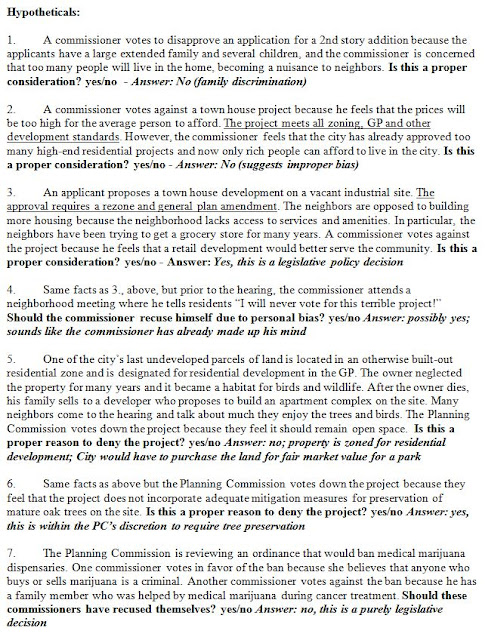So if it is frustrating to you that your elected official won't come up with a straight yes or no for you on your particular issue, ask yourself if you would be happy with him/her agreeing with you but then being unable to vote on the issue at all.
In order to avoid the appearance of bias, I (and possibly many others) will try to not give an opinion but rather say in one form or other, 'I understand your situation but I am keeping an open mind on the issue.'
The next 3 pictures are the entirety of a document on this prepared by one of Sunnyvale's city attorneys on this issue. After these three pages, is more legal opinion by City Attorney John Nagel on court rulings on this.
The following photos of the documents are a little small, so click on any document to enlarge:
Further comments from John Nagel, Sunnyvale's city attorney, below:
=========================================================
The California Supreme Court in Horn v. County of Ventura (1979) 24 Cal.3d 605, discussed actions that are adjudicatory in nature:
Subdivision approvals, like variances and conditional use permits, involve the application of general standards to specific parcels of real property. Such governmental conduct, affecting the relatively few, is “determined by facts peculiar to the individual case” and is “adjudicatory” in nature. (Id. at p. 614.)
In a review of case law and practice guides, the issuance of conditional use permits and most other types of land use permits, approval of zoning variances, tentative subdivision maps are all considered adjudicatory in nature. Other types of land use permits include, but are not limited to special use permits, planned development permits, site development permits and special development permits. In Sunnyvale, we issue special development permits (SDP), which allow for use, site and architectural review (See Sunnyvale Municipal Code Chapter 19.90.)
The Horn court in examining due process rights held:
It is equally well settled, however, that only those governmental decisions which are adjudicative in nature are subject to procedural due process principles. Legislative action is not burdened by such requirements. (emphasis in the original) (Id. at p. 612.)
In Nasha LLC v. City of Los Angeles ((2004) 125 Cal.App.4th 470), a planning commissioner was also a member of a local homeowners’ association and had authored an article in the HOA’s newsletter that was critical of a project’s environmental impacts. The court held that the fact that the commissioner had expressed such concerns as a member of the HOA “gave rise to an unacceptable probability of actual bias and was sufficient to preclude [him] from serving as a ‘reasonably impartial, noninvolved reviewer’” when the matter was heard by the Los Angeles Planning Commission. The HOA article in Nasha read as follows:
MULTIVIEW DRIVE PROJECT THREAT TO WILDLIFE CORRIDOR A proposed project taking five legal lots totaling 3.8 acres for five proposed large homes with swimming pools served by a common driveway off Multiview Drive is winding its way through the Planning process. ... After wildlife leaves Briar Summit heading eastward they must either head southtowards Mt. Olympus or north to the slopes above Universal City. The Multiview Drive site is an absolutely crucial habitat corridor. Please contact Paul Edelman with the Conservancy at 310/ ... or Mark Hennessy who lives adjacent to the project at 323/ ...if you have any questions." (Italics added.)
The use of words like "threat" and "The Multiview Drive is an absolutely crucial habitat corridor" were determined by the court as a clear indicia of advocacy and required the recusal of the commissioner from participating in the Planning Commission consideration of the project.
The key issue in meeting with any developer, applicant or company is to be in a listening mode as you want to avoid making a statement(s) that could be perceived as biased or that you have reached a conclusion about a project(s) that may come before the City Council in the future. In my experience I think it is always helpful for councilmembers to reach out to the City Manager about such invitations so that the City Manager can provide background information about a particular developer, applicant or company and in particular to provide any information about pending or potential applications. Though I am aware of many potential projects and projects for which applications have been filed, the City Manager is more knowledgeable in these areas as the Director of Community Development and planning division staff report directly to her. As for asking questions or seeking information about future plans, you must also be sensitive to whether your questions could be perceived as an opinion about a specific project or in the case of a company their expansion in general.
I wish I could provide a simple and direct answer as to how to assure your contacts with developers, applicants and companies do not run afoul of their due process rights in quasi-judicial matters, but due process is not a “technical conception with a fixed content unrelated to time, place and circumstances. [D]ue Process is flexible and calls for such procedural protections as the situation demands. (citations omitted.)” (Mathews v. Eldridge, 424 U.S. 319, 334.). As stated above being in listening mode is the safest course of action. You always want to avoid make statements or engaging in conversations that could be perceived as an indication that you have formed an opinion about a project or demonstrate an “unacceptable probability of actual bias.” You should always remain sensitive to whether your questions could be perceived as an opinion about a specific project or in the case of a company their expansion in general.


